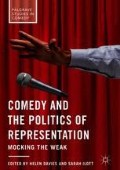Abstract
This is a dialogical exploration of how stand-up comedy can “queer” notions of autism when practised by a stand-up performer with autism. It is underpinned by the “double empathy” problem posed by autistic scientist Damian Milton, which suggests that neurotypical and autistic people experience mutual misunderstanding, rather than the empathy lack of autistic people proposed by medical models. This chapter suggests that the intersubjective relationship formed between audience and performer in a stand-up context can temporarily overcome the double empathy problem. The autistic stand-up performer can therefore temporarily disidentify from stigmatising and stereotyping labels, which preclude them from even displaying a sense of humour.
Access this chapter
Tax calculation will be finalised at checkout
Purchases are for personal use only
References
American Psychiatric Association. 2013. The Diagnostic and Statistics Manual of Mental Disorders, 2nd edition. Arlington, VA: American Psychiatric Publishing.
Austin, J. L. 1975. How to Do Things with Words, 2nd edition. Boston, MA: Harvard University Press.
Bakhtin, Michel. 1984. Rabelais and His World. Bloomington: Indiana University Press.
Boyer, Dominic. 2013. “Simply the Best: Parody and Political Sincerity in Iceland.” American Ethnologist 40, no. 2: 276–87.
Breeze, Maddie. 2015. Seriousness and Women’s Roller Derby: Gender, Organization, and Ambivalence. Basingstoke: AIAA.
Brodie, Ian. 2014. A Vulgar Art: A New Approach to Stand-Up Comedy. Jackson: University Press of Mississippi.
Bumiller, Kristin. 2008. “Quirky Citizens: Autism, Gender and Reimagining Disability.” Signs 33, no. 4 (Summer):967–991.
Butler, Judith. 2006. Gender Trouble. New York: Routledge.
Double, Oliver. 2013. Getting the Joke: The Inner Workings of Stand-Up Comedy. 2nd edition. London: Methuen.
Foucault, Michel. 1984. The Foucault Reader. New York: Pantheon Books.
Fox, Kate. 2018a. “Stand Up and Be (En) Countered: Class, Gender and Northern English Regional Identity in Stand-Up Performance.” PhD diss., University of Leeds.
———. 2018b (Forthcoming). “Humitas: A New Word for Doing Things with Humour.” In Critical Thought-Laughter as Resistance, edited by Iain Mackenzie, Fred Francis and Krista Bonello Rutter Giappone. London: Rowman & Littlefield.
Friedman, Sam. 2014. Comedy and Distinction: The Cultural Currency of a “Good” Sense of Humour. London: Routledge.
Gilbert, Joanne. 2004. Performing Marginality: Humour, Gender and Cultural Critique. Detroit: EDS Publications.
Haden-Guest, Anthony. 2016. “How Karen Finley Turned Trump and Hillary into Brilliant Performance Art.” The Daily Beast, August 21, 2016. http://www.thedailybeast.com/articles/2016/08/21/how-karen-finley-turned-trump-and-hillary-into-brilliant-performance-art.html?via=twitter_page.
Halberstam, Jack. 2011. The Queer Art of Failure. Durham, NC. Duke University Press.
Hemmingson, Michael. 2008. “Make Them Giggle: Auto/Ethnography as Stand Up Comedy – A Response to Denzin’s Call to Performance.” Creative Approaches to Research 1, no. 2: 9–22.
Johnson, Merri Lisa, and Robert McRuer. 2014. “Introduction: Cripistemologies and the Masturbating Girl.” Journal of Literary & Cultural Disability Studies 8, no. 3: 245–255.
Krefting, Rebecca. 2014. All Joking Aside: American Humor and Its Discontents. Baltimore: Johns Hopkins Press.
Lockyer, Sharon. 2015. “From Comedy Targets to Comedy-Makers: Disability and Comedy in Live Performance.” Disability & Society 30, no. 9: 1397–1412. https://doi.org/10.1080/09687599.2015.1106402.
MacRury, Iain. 2012. “Humour as ‘Social Dreaming’: Stand-Up Comedy as Therapeutic Performance.” Psychoanalysis, Culture & Society 17, no. 2: 185–203. https://doi.org/10.1057/pcs.2012.20.
McGrath, James. 2017. Naming Adult Autism. London. Rowman & Littlefield.
Maxwell, Dominic. 2017. “I’ve Reached the Top. Now I’m Going to Stop.” The Times, October 24, 2017.
Milton, Damian. 2012. “On the Ontological Status of Autism: The ‘Double Empathy Problem’.” Disability & Society 27, no. 6: 883–87. https://doi.org/10.1080/09687599.2012.710008.
———. 2014. “Autistic Expertise: A Critical Reflection on the Production of Knowledge in Autism Studies.” Autism 18, no. 7: 794–802. https://doi.org/10.1177/1362361314525281.
Mizejewski, Linda. 2015. Pretty/Funny: Women Comedians and Body Politics. Austin: University of Texas Press.
Mulkay, Mike. 1988. On Humour: Its Nature and Place in Modern Society. Cambridge: Polity Press.
Munoz, José Esteban. 1999. Disidentifications: Queers of Color and the Performance of Politics. Minneapolis: University of Minnesota Press.
Office of Autism Research Coordination (OARC). 2016. “Portfolio Analysis Report.” Accessed December 12, 2017. https://iacc.hhs.gov/publications/portfolio-analysis/2012/portfolio_analysis_2012.pdf.
Quirk, Sophie. 2015. Why Stand-Up Matters. London: Methuen.
Rodriguez, Hector. 2006. “The Playful and the Serious: An Approximation to Huizinga’s Homo Ludens.” Game Studies Journal 6, no. 1.
Smith, Daniel. 2015. “Self-Heckle: Russell Kane’s Stand-Up Comedy as an Example of ‘Comedic Sociology’.” Ephemera 15, no. 3: 561–80.
Tannen, Ricki. 2014. The Female Trickster: The Mask That Reveals, Post-Jungian and Postmodern Psychological Perspectives on Women in Contemporary Culture. New York: Routledge.
Watson, Cate. 2015. Comedy and Social Science: Towards a Methodology of Funny. New York: Routledge.
Wayne, Michael. 2014. Red Kant: Aesthetics, Marxism and the Third Critique. London: Bloomsbury.
Performances
Finley, Karen. 2016. “Unicorn Gratitude Mystery.” New York. Laurie Beeckman Theatre. July 31, 2016.
Fox, Kate. 2017. “Una Q Horn: Putting the Awe into Awkward.” Canterbury. Autism and the Arts Festival, University of Kent. April 30, 2017.
Hagan, Jackie. 2015. “Some People Have Too Many Legs.” Manchester. Contact Theatre. May 9, 2015.
Author information
Authors and Affiliations
Editor information
Editors and Affiliations
Rights and permissions
Copyright information
© 2018 The Author(s)
About this chapter
Cite this chapter
Fox, K. (2018). Standing Up to False Binaries in Humour and Autism: A Dialogue. In: Davies, H., Ilott, S. (eds) Comedy and the Politics of Representation. Palgrave Studies in Comedy. Palgrave Macmillan, Cham. https://doi.org/10.1007/978-3-319-90506-8_10
Download citation
DOI: https://doi.org/10.1007/978-3-319-90506-8_10
Published:
Publisher Name: Palgrave Macmillan, Cham
Print ISBN: 978-3-319-90505-1
Online ISBN: 978-3-319-90506-8
eBook Packages: Literature, Cultural and Media StudiesLiterature, Cultural and Media Studies (R0)

